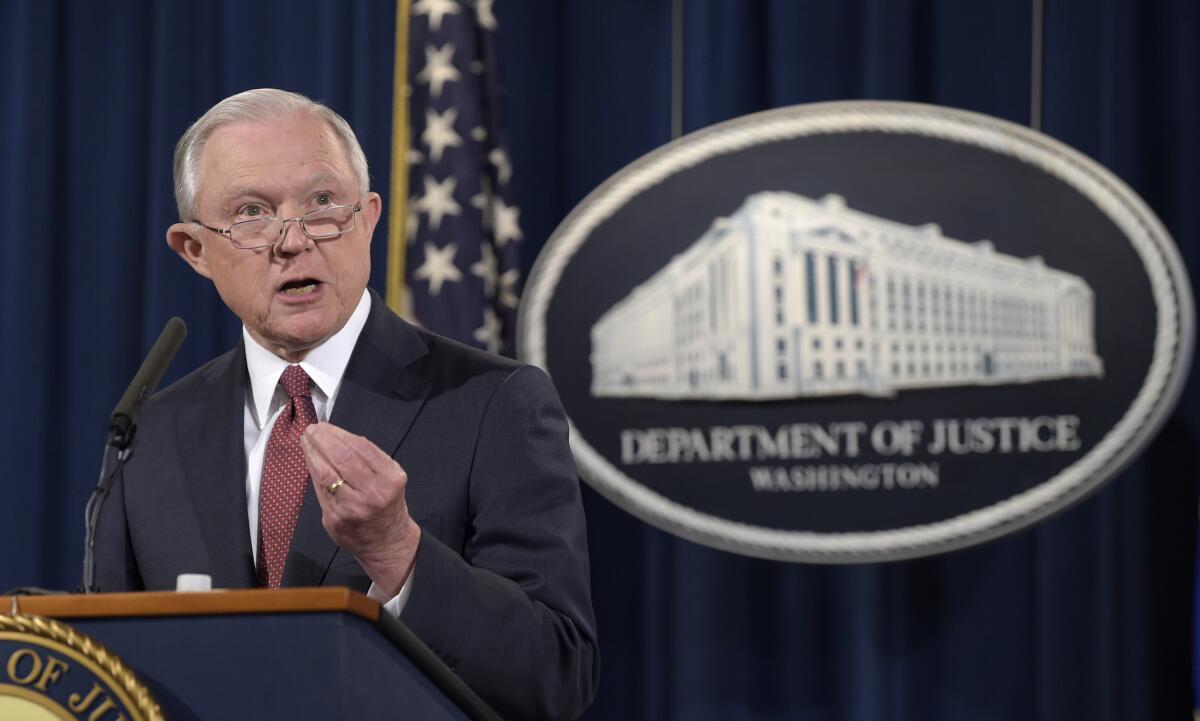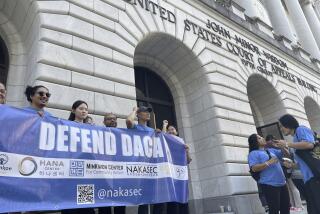Trump’s phaseout of DACA is facing legal challenges

Reporting from Washington — President Trump’s repeal of an Obama-era program that shielded hundreds of thousands of “Dreamers” from deportation faces a determined challenge in the courts from immigrant rights lawyers who call the change abrupt, unjustified and unconstitutional.
But they recognize it will not be easy to block Trump’s action because the president has broad power over immigration enforcement, a point often made when President Obama was in the White House.
Some are already looking to a federal judge in Brooklyn, N.Y., who has before him a lawsuit filed on behalf of Martin Batalla Vidal, who was born in Mexico but has lived in New York since he was brought there as a 7-year-old. His lawsuit, related to a proposed expansion of the Deferred Action for Childhood Arrivals program that was blocked in 2015, is pending before U.S. District Judge Nicholas G. Garaufis, a President Clinton appointee.
On Tuesday, a team of immigrants rights lawyers sent a six-page letter to the judge saying they wanted to expand Vidal’s lawsuit and make it a challenge to Trump’s repeal order.
Karen Tumlin, legal director for the National Immigration Law Center in Los Angeles, said Trump’s decision is legally suspect because so many Dreamers — immigrants brought to the U.S. illegally as children — have relied on the DACA program to obtain work permits and start careers.
Under federal procedural law, “you don’t get to abruptly change the rules without giving a reasoned explanation,” she said. “The federal government can’t just end a long-standing program that individuals have come forward and relied upon.”
Moreover, she said, Trump’s decision is unconstitutionally discriminatory because it rests on bias against Latinos in general and Mexicans in particular. “Remember he began his campaign by targeting Mexicans,” she said.
The letter to Garaufis said Trump as a candidate “expressed frank and often vulgar animus” toward Mexicans. On the day he announced his candidacy, he said Mexicans were crossing the border “bringing drugs. They’re bringing crime. They’re rapists.
Of the nearly 800,000 people who were brought to the United States as children and have taken advantage of Obama’s program, 79% are from Mexico and 93% are Latino, they told the judge.
It remains to be seen whether such an argument will prevail, particularly at the Supreme Court. Their argument of racial bias may be undercut by Trump’s recent statements that he “loves” Dreamers and ultimately hopes Congress will take action to help them.
If DACA supporters can persuade a federal court to at least suspend Trump’s order while it is reviewed by the courts, they could in effect buy more time for Dreamers to postpone the termination of the program.
Separately, Democratic state attorneys in New York, Washington and California said Tuesday that they will also go to court in hopes of blocking Trump’s repeal. New York Atty. Gen. Eric Schneiderman described the repeal as “cruel, gratuitous and devastating.”
“Dreamers are Americans in every way,” he said. “They played by the rules. They pay taxes. And they’ve earned the right to stay in the only home they ever known.”
In Sacramento, California Atty. Gen. Xavier Becerra said, “We are prepared to go to court. How and when — stay tuned.” He said the DACA program has “been tremendously successful for our economy and for these young people.” More than one-quarter of the DACA recipients live in California.
Sessions said Obama’s “executive amnesty” program was being ended because it violated “the Constitution’s separation of powers.” Although Obama and his lawyers said the president as the chief executive had ample authority to avoid deporting young immigrants who had not broken the law, Sessions said it was an “unconstitutional exercise of authority by the executive branch” because Congress had not approved the change.
The Trump administration’s position is unusual since the president is essentially arguing to limit the executive branch’s powers. Normally presidents have argued that they have broad discretion in matters of immigration, particularly in setting priorities for deportation.
In defending the administration’s travel bans, White House attorneys argued the opposite: that courts should defer to the executive branch in dealing with immigration.
The administration appears to have learned from its mistakes. This year, Trump issued a series of executive orders to make quick changes in law. The first travel ban was announced without warning on a Friday in January, disrupting the plans of countless international travelers. Courts blocked the order, saying the administration failed to follow procedures or provide adequate notice.
In contrast, the DACA repeal procedure is phased in over the next six months.
Courts have never ruled on the constitutionality of the DACA program. It faced no significant challenge in the courts when it was implemented.
However, when Obama moved to expand the program in 2014 to include millions of parents who had legal children in the United States, the state attorneys general in Texas and other Republican-led states sued.
A judge in Brownsville, Texas, blocked Obama’s expanded order by citing the Administrative Procedure Act, the same rule now being cited in the challenge to Trump’s move to rescind the policy. A federal appeals court in New Orleans upheld the judge’s order. And the Supreme Court split 4 to 4 on the issue in 2016, leaving the law in limbo.
On Twitter: DavidGSavage
ALSO
‘Dreamers’ face tight deadline to renew DACA permits
David Horsey: America cannot afford to lose 800,000 young ‘Dreamers’
Republicans face a divisive fight over immigrants that could define the party’s future
More to Read
Get the L.A. Times Politics newsletter
Deeply reported insights into legislation, politics and policy from Sacramento, Washington and beyond. In your inbox three times per week.
You may occasionally receive promotional content from the Los Angeles Times.











